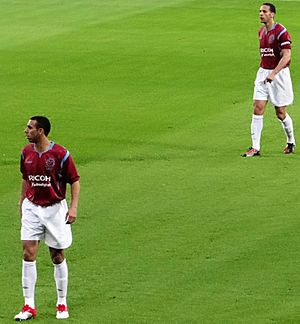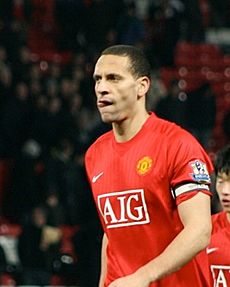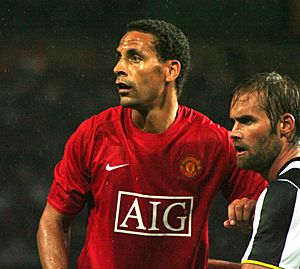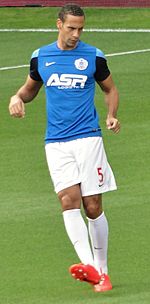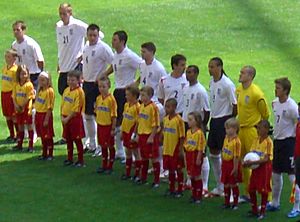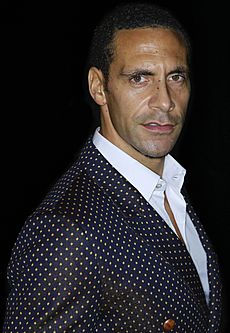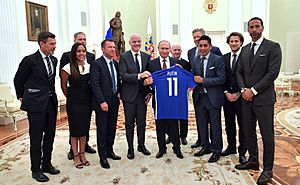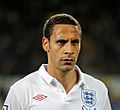Rio Ferdinand facts for kids
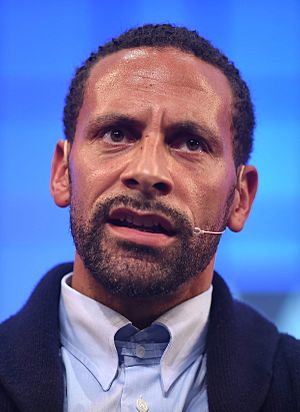
Ferdinand in 2015
|
|||
| Personal information | |||
|---|---|---|---|
| Full name | Rio Gavin Ferdinand | ||
| Date of birth | 7 November 1978 | ||
| Place of birth | Camberwell, England | ||
| Height | 6 ft 2 in (1.89 m) | ||
| Position(s) | Centre-back | ||
| Youth career | |||
| 1992–1995 | West Ham United | ||
| Senior career* | |||
| Years | Team | Apps | (Gls) |
| 1995–2000 | West Ham United | 127 | (2) |
| 1996–1997 | → AFC Bournemouth (loan) | 10 | (0) |
| 2000–2002 | Leeds United | 54 | (2) |
| 2002–2014 | Manchester United | 312 | (7) |
| 2014–2015 | Queens Park Rangers | 11 | (0) |
| Total | 514 | (11) | |
| International career | |||
| 1996–1997 | England U18 | 7 | (0) |
| 1997–2000 | England U21 | 5 | (0) |
| 1997–2011 | England | 81 | (3) |
| *Club domestic league appearances and goals | |||
Rio Gavin Ferdinand (born 7 November 1978) is a retired English professional footballer who played as a centre-back. He is now a television pundit for TNT Sports. Ferdinand played for the England national team 81 times between 1997 and 2011 and was part of three FIFA World Cup squads. Many people consider him one of England's greatest defenders ever.
Ferdinand started his career at West Ham United, making his professional debut in 1996. He quickly became a fan favorite. In 1997, he became the youngest defender to play for England at that time. His talent led Leeds United to buy him for a record-breaking £18 million. After two seasons there, he joined Manchester United in 2002 for around £30 million, which was another transfer fee record.
At Manchester United, Ferdinand won many trophies, including six Premier League titles. His time at the club ended in 2014. He then joined Queens Park Rangers for one season before he announced his retirement from football on 30 May 2015.
His brother, Anton, is also a footballer. His cousins, Les Ferdinand and Kane Ferdinand, also played professional football.
Contents
Early Life and Education
Rio Gavin Ferdinand was born in Camberwell, London, and grew up in Peckham. His mother, Janice, was a child carer, and his father, Julian, was a tailor. His parents separated when he was 14, but his father stayed involved in his life, taking him to football training.
Ferdinand was a talented child who enjoyed many activities. Besides football, he took part in gymnastics, drama, and even ballet. At age 10, he was invited to train at the Queens Park Rangers academy. At age 11, he won a scholarship to the Central School of Ballet in London, which he attended for four years.
A youth coach once told an 11-year-old Ferdinand, "I'm going to call you Pelé, son, I like the way you play." He trained with several clubs as a youth, but in 1992, he joined the youth team of West Ham United.
Club Career
West Ham United
Ferdinand moved up through the youth teams at West Ham and earned a spot on the first team. He made his debut on 5 May 1996.
He became very popular with the fans. In the 1997–98 season, at just 19 years old, he won the "Hammer of the Year" award as the club's best player.
Loan to AFC Bournemouth
In November 1996, Ferdinand was loaned to AFC Bournemouth to get more experience. He played 10 games for them before returning to West Ham in January 1997.
Leeds United
In November 2000, Ferdinand joined Leeds United for £18 million. This was a British transfer record at the time, and it made him the world's most expensive defender.
At Leeds, he became an important player. The team reached the semi-finals of the UEFA Champions League, and Ferdinand scored a goal in the quarter-final. In August 2001, he was made the team captain. After the 2002 FIFA World Cup, Leeds had financial problems and had to sell him.
Manchester United
On 22 July 2002, Ferdinand joined Manchester United. The transfer fee made him the most expensive British footballer and the world's most expensive defender for a second time.
First Years at the Club
In his first season, Ferdinand helped Manchester United win the Premier League title.
In September 2003, he missed a required test from football authorities. Because of this, he was banned from football for eight months, from January to September 2004. This meant he missed the rest of the season and the Euro 2004 tournament. When he returned, he played well and was praised for his performances.
On 14 December 2005, he scored his first goal for United in a 4–0 win against Wigan Athletic. He was named in the PFA Team of the Year for the 2006–07 season, along with seven of his teammates.
Champions League Success and Later Years
The 2007–08 season was very successful for Ferdinand. He scored his first European goal for United against Dynamo Kyiv. On 8 March 2008, in an FA Cup match against Portsmouth, he had to play as a goalkeeper after the team's keepers were unable to play.
On 21 May 2008, Ferdinand captained Manchester United to victory in the Champions League Final against Chelsea.
Ferdinand had some injuries during the 2009–10 season. He returned to action on 28 January 2010. He continued to be a key player for United, helping them win more trophies. On 12 May 2013, he scored the winning goal against Swansea City. This was the last goal scored at Old Trafford under manager Alex Ferguson.
His contract with Manchester United ended in 2014, and he left the club after 12 successful years.
Queens Park Rangers
On 17 July 2014, Ferdinand signed a one-year contract with Queens Park Rangers. He played 12 times for the club. On 30 May 2015, Ferdinand announced his retirement from professional football.
International Career
Ferdinand played for the England national team 81 times and scored three goals. He was selected for four World Cup squads but missed the 2010 tournament because of an injury.
He made his debut for England on 15 November 1997, against Cameroon. At 19 years and 8 days old, he was the youngest defender to ever play for England at the time.
Ferdinand was a starting defender for England at the 2002 and 2006 FIFA World Cups. He was named England's captain on 5 February 2010. However, a knee injury just before the 2010 World Cup meant he could not play in the tournament.
In May 2013, Ferdinand announced his retirement from international football. He said it was the right time to let younger players have a chance and to focus on his club career.
Style of Play
Ferdinand was known for his elegant and graceful style of defending. He was very skilled with the ball, had good balance, and was confident in possession. He could pass the ball well with either foot and often started attacks from the back.
He was often paired with a more physical defender, like Nemanja Vidić at Manchester United. At his peak, Ferdinand was considered one of the best defenders in the world. He was fast, hard-working, and intelligent on the field. He was also a strong leader.
Life After Football
Television and Media
Ferdinand has been involved in many media projects. In 2006, he hosted a TV show called Rio's World Cup Wind-Ups, where he played jokes on his England teammates. He has also produced a film called Dead Man Running.
In 2009, he launched a digital magazine called #5 Magazine. Since 2015, he has worked as a football expert for TNT Sports.
In 2017, he made a documentary for BBC One called Rio Ferdinand: Being Mum and Dad, which won a BAFTA award.
Charity Work and Honours
In 2009, Ferdinand started the Live the Dream Foundation, a charity to help young people with education and jobs.
He was appointed an Officer of the Order of the British Empire (OBE) in 2022 for his work in football and charity. In 2023, he was inducted into the Premier League Hall of Fame.
Personal Life
Ferdinand grew up in Peckham, London. His brother, Anton Ferdinand, and cousins, Les Ferdinand and Kane Ferdinand, are also footballers.
Ferdinand married Rebecca Ellison in 2009. They had three children together. Sadly, Rebecca passed away from cancer in 2015. He wrote a book about his experience called Thinking Out Loud.
In 2019, Ferdinand married Kate Wright. They have a son, born in 2020.
Career Statistics
Club
| Club | Season | League | FA Cup | League Cup | Europe | Other | Total | |||||||
|---|---|---|---|---|---|---|---|---|---|---|---|---|---|---|
| Division | Apps | Goals | Apps | Goals | Apps | Goals | Apps | Goals | Apps | Goals | Apps | Goals | ||
| West Ham United | 1995–96 | Premier League | 1 | 0 | 0 | 0 | 0 | 0 | — | — | 1 | 0 | ||
| 1996–97 | Premier League | 15 | 2 | 1 | 0 | 1 | 0 | — | — | 17 | 2 | |||
| 1997–98 | Premier League | 35 | 0 | 6 | 0 | 5 | 0 | — | — | 46 | 0 | |||
| 1998–99 | Premier League | 31 | 0 | 1 | 0 | 1 | 0 | — | — | 33 | 0 | |||
| 1999–2000 | Premier League | 33 | 0 | 1 | 0 | 4 | 0 | 3 | 0 | 6 | 0 | 46 | 0 | |
| 2000–01 | Premier League | 12 | 0 | — | 2 | 0 | — | — | 14 | 0 | ||||
| Total | 127 | 2 | 9 | 0 | 13 | 0 | 3 | 0 | 6 | 0 | 158 | 2 | ||
| AFC Bournemouth (loan) | 1996–97 | Second Division | 10 | 0 | — | — | — | 1 | 0 | 11 | 0 | |||
| Leeds United | 2000–01 | Premier League | 23 | 2 | 2 | 0 | — | 7 | 1 | — | 32 | 3 | ||
| 2001–02 | Premier League | 31 | 0 | 1 | 0 | 2 | 0 | 7 | 0 | — | 41 | 0 | ||
| Total | 54 | 2 | 3 | 0 | 2 | 0 | 14 | 1 | 0 | 0 | 73 | 3 | ||
| Manchester United | 2002–03 | Premier League | 28 | 0 | 3 | 0 | 4 | 0 | 11 | 0 | — | 46 | 0 | |
| 2003–04 | Premier League | 20 | 0 | 0 | 0 | 0 | 0 | 6 | 0 | 1 | 0 | 27 | 0 | |
| 2004–05 | Premier League | 31 | 0 | 5 | 0 | 1 | 0 | 5 | 0 | 0 | 0 | 42 | 0 | |
| 2005–06 | Premier League | 37 | 3 | 2 | 0 | 5 | 0 | 8 | 0 | — | 52 | 3 | ||
| 2006–07 | Premier League | 33 | 1 | 7 | 0 | 0 | 0 | 9 | 0 | — | 49 | 1 | ||
| 2007–08 | Premier League | 35 | 2 | 4 | 0 | 0 | 0 | 11 | 1 | 1 | 0 | 51 | 3 | |
| 2008–09 | Premier League | 24 | 0 | 3 | 0 | 1 | 0 | 11 | 0 | 4 | 0 | 43 | 0 | |
| 2009–10 | Premier League | 13 | 0 | 0 | 0 | 1 | 0 | 6 | 0 | 1 | 0 | 21 | 0 | |
| 2010–11 | Premier League | 19 | 0 | 2 | 0 | 1 | 0 | 7 | 0 | 0 | 0 | 29 | 0 | |
| 2011–12 | Premier League | 30 | 0 | 1 | 0 | 0 | 0 | 6 | 0 | 1 | 0 | 38 | 0 | |
| 2012–13 | Premier League | 28 | 1 | 2 | 0 | 0 | 0 | 4 | 0 | — | 34 | 1 | ||
| 2013–14 | Premier League | 14 | 0 | 1 | 0 | 1 | 0 | 7 | 0 | 0 | 0 | 23 | 0 | |
| Total | 312 | 7 | 30 | 0 | 14 | 0 | 91 | 1 | 8 | 0 | 455 | 8 | ||
| Queens Park Rangers | 2014–15 | Premier League | 11 | 0 | 1 | 0 | 0 | 0 | — | — | 12 | 0 | ||
| Career total | 514 | 11 | 43 | 0 | 29 | 0 | 108 | 2 | 15 | 0 | 709 | 13 | ||
International
| National team | Year | Apps | Goals |
|---|---|---|---|
| England | 1997 | 1 | 0 |
| 1998 | 4 | 0 | |
| 1999 | 3 | 0 | |
| 2000 | 2 | 0 | |
| 2001 | 9 | 0 | |
| 2002 | 9 | 1 | |
| 2003 | 5 | 0 | |
| 2004 | 3 | 0 | |
| 2005 | 8 | 0 | |
| 2006 | 12 | 0 | |
| 2007 | 8 | 1 | |
| 2008 | 8 | 1 | |
| 2009 | 4 | 0 | |
| 2010 | 4 | 0 | |
| 2011 | 1 | 0 | |
| Total | 81 | 3 | |
Honours
West Ham United
- UEFA Intertoto Cup: 1999
Manchester United
- Premier League: 2002–03, 2006–07, 2007–08, 2008–09, 2010–11, 2012–13
- Football League Cup: 2005–06, 2008–09
- FA Community Shield: 2003, 2007, 2008, 2011
- UEFA Champions League: 2007–08
- FIFA Club World Cup: 2008
Individual
- West Ham United Hammer of the Year: 1997–98
- PFA Premier League Team of the Year: 2001–02, 2004–05, 2006–07, 2007–08, 2008–09, 2012–13
- Premier League Player of the Month: October 2001
- ESM Team of the Year: 2007–08
- FIFPro World XI: 2007–08
- London Youth Games Hall of Fame: 2010 inductee
- Premier League 20 Seasons Awards (1992–93 to 2011–12)
- Fantasy Teams of the 20 Seasons (Panel choice)
- English Football Hall of Fame: 2016 Inductee
- Premier League Hall of Fame: 2023
Orders and special awards
- BAFTA Award for Best Single Documentary: 2018
- Honorary degree of Doctor of Letters (D.Litt) from London South Bank University: 3 March 2022
- Officer of the Order of the British Empire in the Civil Division "For services to Association Football and to Charity" in the 2022 Queen's Birthday Honours List: 1 June 2022
Images for kids
See also
 In Spanish: Rio Ferdinand para niños
In Spanish: Rio Ferdinand para niños
 | Laphonza Butler |
 | Daisy Bates |
 | Elizabeth Piper Ensley |


